Are you 21 or older?
Indacloud products are only for use in states where the sale and consumption of such products are legal. By clicking YES, I certify that I am over the age of 21 and will comply with the above statement.
Indacloud products are only for use in states where the sale and consumption of such products are legal. By clicking YES, I certify that I am over the age of 21 and will comply with the above statement.

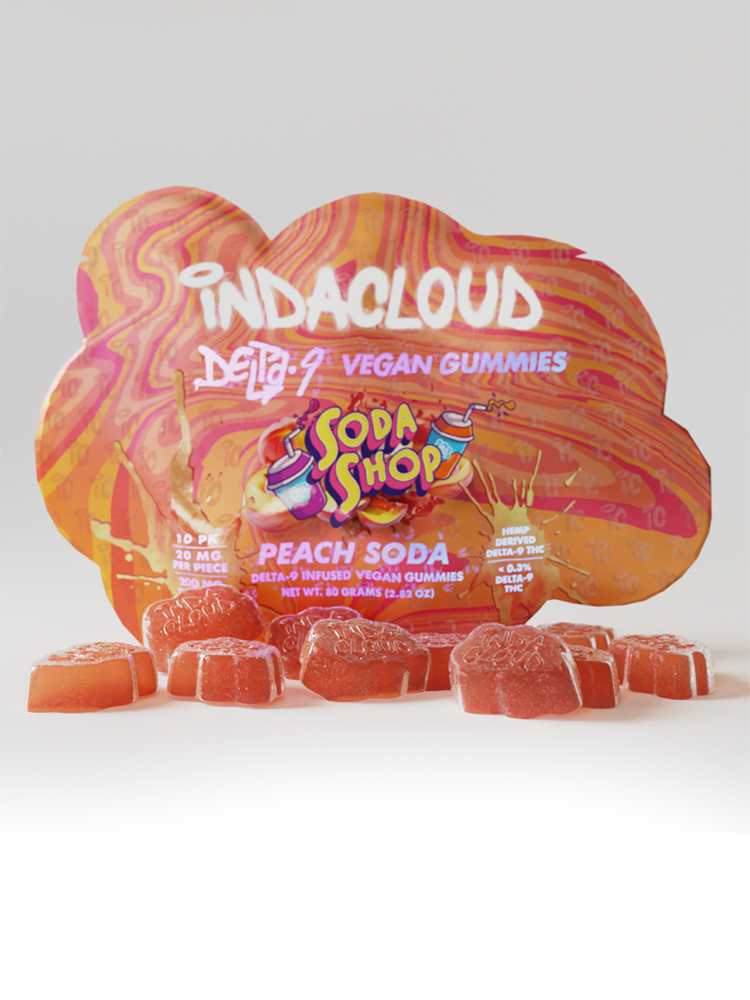

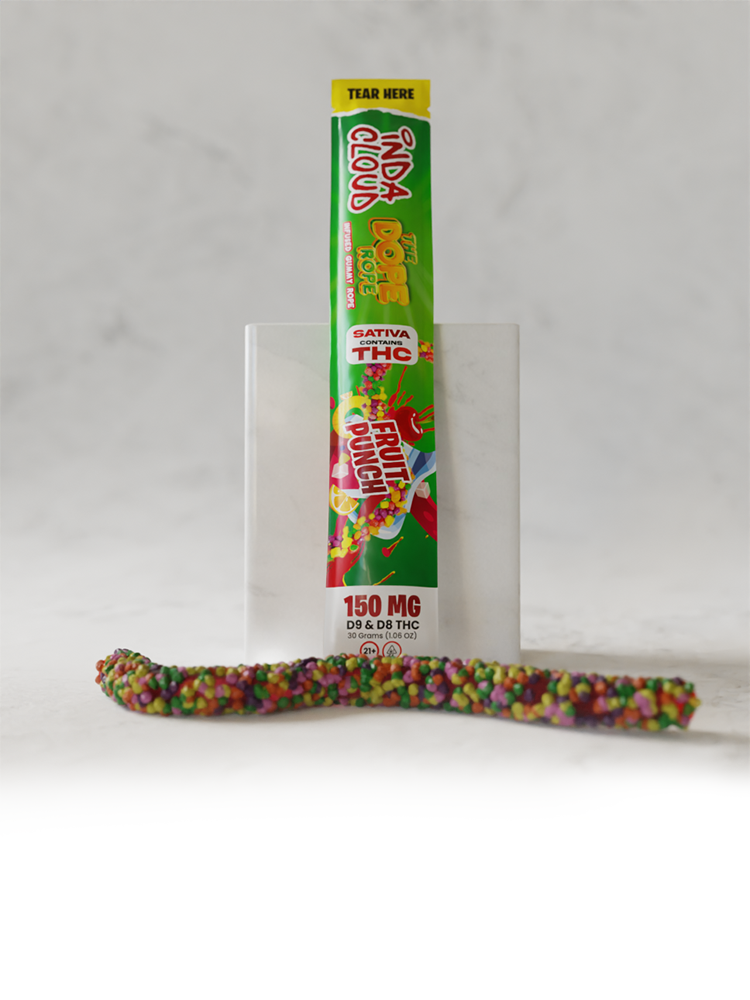
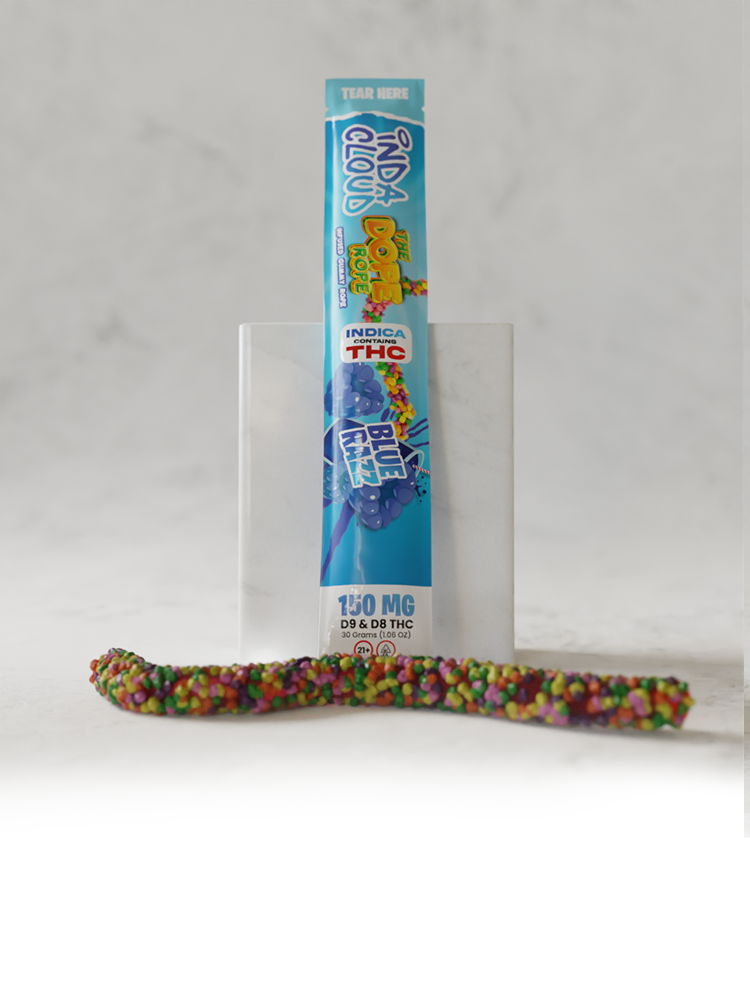






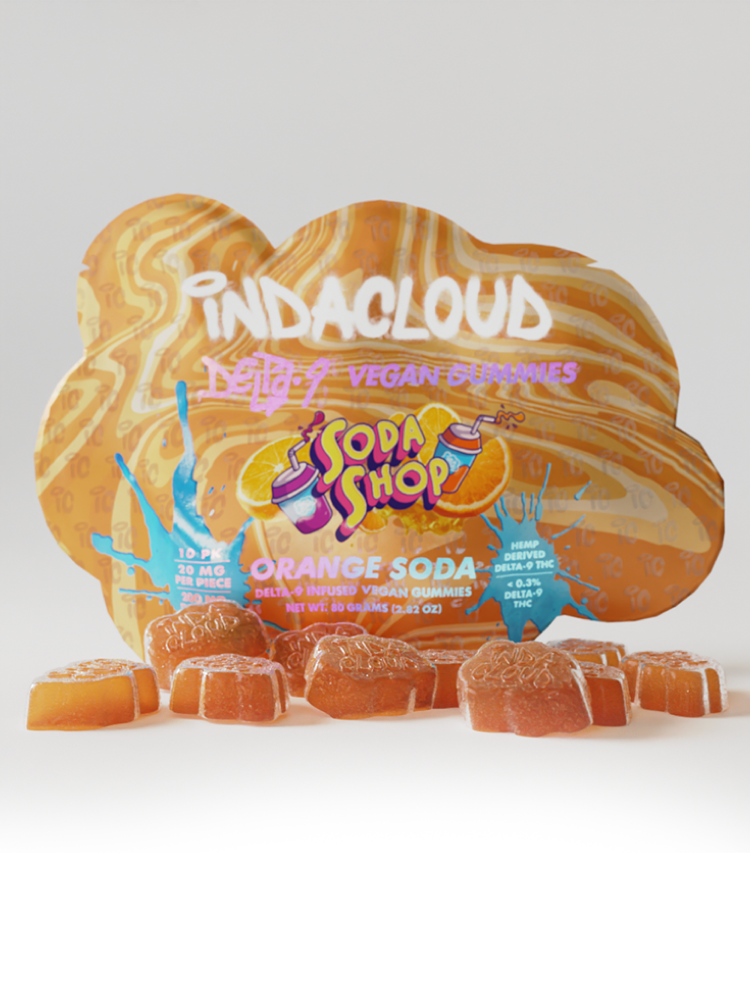

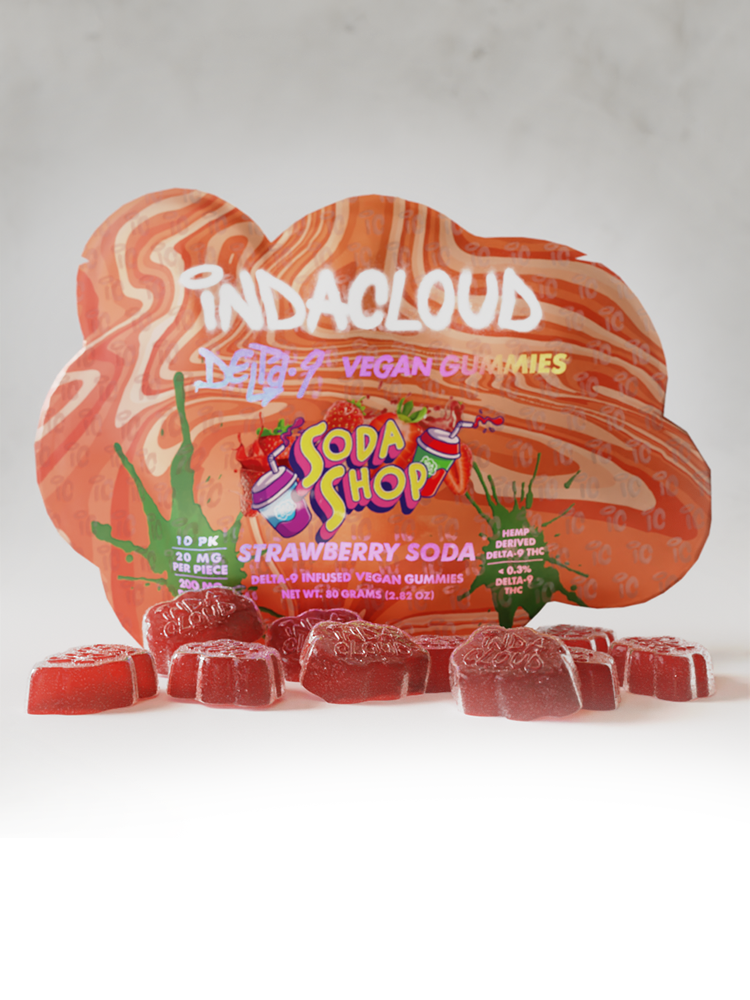

Delta 9 THC, a widely recognized cannabinoid derived from cannabis, is lauded for delivering a more intense high compared to its close relative, Delta 8 THC. This makes Delta 9 THC a popular option among enthusiasts seeking a more potent experience. At Indacloud, we offer the best Delta 9 products, providing an excellent balance of potency and price.
The human body naturally interacts with cannabinoids like Delta 9 THC through a system called the endocannabinoid system (ECS). This system comprises two main receptors:
CB1 receptors, primarily located in the nervous system, significantly mediate the psychoactive reactions following cannabinoid consumption. Delta 9 THC interacts with these receptors, influencing the serotonin system that regulates mood and digestion. Consequently, the “high” associated with THC consumption is primarily the result of this interaction within the ECS through CB1 receptors.
For those who enjoy a burst of flavor along with their high, our Delta 9 gummies make a perfect choice. These delightful edibles come in an array of fruity flavors and are an enjoyable, discreet method of experiencing the potent effects of Delta 9 THC. They easily rank among our best Delta 9 products, loved for their delicious taste and consistent potency.
Navigating the myriad types of Delta 9 THC products available on the cannabis market can be overwhelming. That’s where Indacloud comes in. As a leading provider of online cannabis-derived products, we present our best-selling Delta 9 THC items to simplify your selection process:
Our Orange Funta Delta 9 THC gummy boasts a delightful blend of fruity, bubbly, and bright flavors, achieved without infringing on any soda factory’s property rights! Delivering a high akin to the buzz from your favorite carbonated drink, these Sativa-dominant gummies provide an exceptional high. They are packed with 200mg of Delta 9 THC, with each bag containing ten 15mg gummies.
The Grape Funta Delta 9 THC gummies offer a relaxing, delicious high that will keep you coming back for more. These gummies offer authentic grape flavor with every bite and provide an excellent high, thanks to the 200mg of Delta 9 THC and ten 15mg gummies in each bag.
Regarded as the best Delta 9 THC gummy in the market, our Strawberry Funta variant offers a delicious and potent high that can be enjoyed day or night. Each bag contains ten 15mg gummies loaded with 200mg of Delta 9 THC.
Indacloud strives to provide you with an exceptional Delta 9 THC experience, offering the best Delta 9 carts for sale and a variety of other top-tier products, all at a competitive Delta 9 price. How Delta 9 THC makes you feel is subjective and varies from person to person. However, some common effects include:
Consuming Delta 9 THC products can indirectly stimulate your brain’s reward center, releasing dopamine, a neurotransmitter associated with the feeling of pleasure and happiness, thus creating an intense high.
Many cannabis users turn to Delta 9 THC for its potential health benefits. Some cannabis and hemp-derived cannabinoids can allow users to experience a gentle, subtle high, particularly when consumed in low doses. For this reason, it’s often recommended to start with a lower dose and gradually increase it based on your tolerance and desired effect.
At Indacloud, we pride ourselves on delivering a diverse selection of the best Delta 9 products, including gummies, edibles, vapes, and prerolls, all at a competitive Delta 9 price. Every product in our inventory undergoes multi-stage lab testing to ensure safety and consistency. Buying Delta 9 online from Indacloud ensures a seamless shopping experience with rapid order fulfillment.
Every individual’s experience with Delta 9 THC can vary significantly due to several factors. It is crucial to recognize these determining factors to optimize your consumption experience with our best Delta 9 products:
Our bodies respond to cannabinoids uniquely, primarily due to differences in individual tolerance. As such, the amount of Delta 9 THC that induces an intense high in one person may not yield the same result in another.
Different strains of cannabis come with their unique terpene profiles, aromas, and flavors. The effects experienced can be influenced by the strain you choose, whether cannabis Sativa, Indica, or a Hybrid.
The quantity of Delta 9 THC consumed can significantly impact the experience. Higher doses typically yield a more potent high, especially given that THC tends to be more potent than other cannabinoids.
The chosen method of consumption significantly affects the onset and duration of the effects. When smoking, the onset of THC effects is rapid and typically lasts about two hours. In contrast, consuming Delta 9 THC in gummies or other edibles leads to a slower onset (between 45 minutes to three hours), with effects lasting six to ten hours. For tinctures and inhalation methods, effects are generally felt within 10 to 30 minutes and can last one to two hours.
Our Delta 9 THC product collection at Indacloud blends potency, variety, and customizability, offering an unparalleled experience. Whether you are well-acquainted with cannabis or new to its benefits, we have a Delta 9 THC product that is just right for you. Uncover the transformative power of Delta 9 THC with Indacloud today. Step into a world of intense, satisfying highs with our superior range of products.
Selecting the best Delta 9 brand depends on individual preferences regarding strength, flavor, and overall experience. However, one brand in the cannabis industry that consistently receives high praise is Indacloud. Indacloud has made a name in the industry with its premium Delta 9 THC blunts, lauded for their exceptional quality and potency.
The strength of Delta 9 THC depends on its formulation and concentration. Premium cannabis products like concentrates or extracts such as shatter, wax, or rosin tend to have the highest Delta 9 THC content, often over 80%. However, it’s important to remember that the effects of Delta 9 THC can vary greatly depending on the individual’s tolerance, metabolism, and method of consumption. Always use these potent products with caution and start with small doses.
Delta 8 THC is considered a powerful alternative to Delta 9. It offers many of the similar benefits as Delta 9 but is often described as producing a milder, more manageable high. This makes Delta 8 a popular choice among users who find the effects of Delta 9 to be too intense. Products like Indacloud’s Delta 9 THC blunts and tinctures have received positive reviews for their potency and effectiveness.
Euphoria is a common effect associated with Delta 9 THC, and it can be particularly pronounced when consumed in edible form. One product that has been highly praised for its euphoric effects is the Delta 9 THC gummies by Indacloud. These gummies are known for their delicious flavors, consistent dosing, and long-lasting, euphoric high they provide.
The price of Delta 9 THC products can vary greatly depending on the type of product, its potency, the brand, and where it’s sold. A standard Delta 9 THC gummy might cost between $30-$60. Always remember to consider quality and safety, not just price, when purchasing Delta 9 products.
Generally, Delta 9 THC products tend to be more expensive than Delta 8. This is primarily due to the legal status and the complex extraction process associated with Delta 9 THC. However, prices can vary depending on the brand, potency, and type of product.
The amount of Delta 9 THC that should be consumed per day varies widely based on individual tolerance, the desired effects, and the form of consumption. It is often recommended for beginners to start with a small dose (such as 5-10mg) and wait to see how it affects them before taking more. Always consult with a healthcare professional before starting any new supplement regimen.
The amount of Delta 9 THC required to produce a high can vary greatly depending on individual factors like tolerance, body weight, and metabolism. Even a small dose of 2-5mg may be enough for a novice to produce noticeable effects. However, for a regular user, significantly higher doses may be required.
Delta 9 THC is found in a wide range of products derived from cannabis plants, including vape cartridges, edibles like gummies or chocolates, oils and tinctures, capsules, drinks, and even topicals. It’s also the main psychoactive compound in traditional smoked or vaporized cannabis.
Delta 9 THC is surely one of the most potent and naturally occurring cannabinoids found in the cannabis plant. It’s primarily responsible for the plant’s psychoactive effects. Other cannabinoids like Delta 8 THC and CBD also have notable effects but are generally less potent than Delta 9.
Whether Delta 9 THC is “better” than Delta 8 THC depends largely on what you are looking for. Delta 9 is more potent and produces a more intense high, which some users prefer. On the other hand, Delta 8 offers many of the same benefits but with a milder, more manageable high, which others find more enjoyable. It’s a matter of personal preference.
Delta 9 THC’s legal status varies widely and is largely dependent on where you are located. It is essential to note that Delta 9 THC is a compound derived from the marijuana plant, which is not federally legal in the United States. However, certain states have legalized marijuana for medicinal and/or recreational use, making Delta 9 THC legal within those jurisdictions. In other parts of the world, the legality of Delta 9 THC also differs widely. So, it is critical to understand your local laws and regulations regarding Delta 9 THC before purchasing or consuming products containing this compound.
The duration before Delta 9 THC’s effects kick in can vary significantly depending on the method of consumption. If you are smoking or vaping, the onset of effects can be almost immediate, often within a few minutes. On the other hand, if you are consuming edibles or Delta 9 THC capsules, the effects might not be felt until anywhere between 30 minutes to 2 hours due to the time needed for digestion. Topicals, tinctures, or sublingual also have different onset times, typically ranging between 15 minutes to an hour.
Yes, Delta 9 THC is known to produce psychoactive effects, meaning it can make you feel “high.” This is because of its ability to bind with the CB1 receptors, which are part of the body’s endocannabinoid system (ECS). The interaction of Delta 9 THC with these receptors stimulates the release of neurotransmitters in the brain, leading to various physiological and psychoactive effects. It’s essential to start with small doses if you are new to Delta 9 THC and gradually increase as you understand your tolerance level.
The availability of Delta 9 THC products online largely depends on local laws and regulations. In regions where marijuana and its derivatives are legal, it is possible to find and purchase a wide range of Delta 9 THC products online, including some of the best Delta 9 carts and other Delta 9 products. However, shipping restrictions may apply, especially for cross-state or international shipping, due to differing regulations. Always ensure you are purchasing from a reputable source and that the transaction complies with all applicable laws.
Dosing Delta 9 THC products should be done carefully, considering several factors, including individual tolerance, desired effects, and the specific product used. Start with a small dose and closely monitor your reactions. As your tolerance increases, you can gradually increase the dosage. However, it is always best to try consulting with a healthcare professional or a knowledgeable cannabis consultant to determine a safe and effective dosage based on your needs and circumstances.
Like hemp-derived products, the method of use for Delta 9 THC products varies depending on the delivered form. You will need a compatible vaping device for vape cartridges, and you simply inhale the vapor produced. Edibles and capsules are taken orally, whereas tinctures are usually put under the tongue for a few moments before swallowing. On the other hand, topicals are applied directly to the target area on the skin. Always follow the specific usage instructions provided with each product for the best and safest results.
Delta 9 THC can potentially result in a positive drug test. Most standard drug tests are used to detect the presence of THC metabolites in your body. So, if you have consumed Delta 9 THC in any form, it will likely appear on a drug test. The detection period can vary depending on several factors, including the quantity consumed, the frequency of use, the metabolism rate, and the specific type of drug test conducted.
While Delta 9 THC is a primary component of marijuana (commonly referred to as weed), they are not the same. Marijuana is a plant that contains hundreds of different compounds, including various cannabinoids, terpenes, and flavonoids. Delta 9 THC is one specific cannabinoid found in the plant responsible for most of marijuana’s psychoactive effects. Therefore, while Delta 9 THC is derived from marijuana, it represents only one aspect of the plant’s complex composition.
Delta 9 THC and CBD are both cannabinoids but are different compounds with different effects. Delta 9 THC is hugely popular for its psychoactive properties. In contrast, CBD is non-psychoactive and is often associated with therapeutic benefits such as chronic pain relief, anxiety reduction, and inflammation reduction. Both compounds are found in marijuana and the hemp plant but in different concentrations.
Taking Delta 9 THC on an empty stomach may lead to a quicker onset and potentially stronger effects, especially with edible products. This is because there is less food to slow down the absorption of the cannabinoid THC into your bloodstream. However, some may find this leads to an uncomfortable intensity of effects or stomach discomfort. So, it is often recommended to consume Delta 9 THC products and some food, especially if you’re new to them or sensitive to their effects.
Copyright 2023 © Indacloud